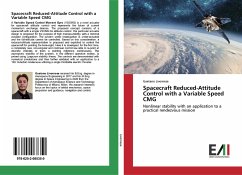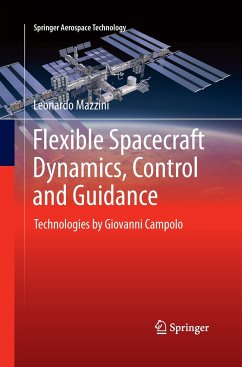
Guidance, Navigation, and Control for Spacecraft Rendezvous and Docking: Theory and Methods
Versandkostenfrei!
Versandfertig in 6-10 Tagen
151,99 €
inkl. MwSt.
Weitere Ausgaben:

PAYBACK Punkte
76 °P sammeln!
This book focuses on the theory and design methods for guidance, navigation, and control (GNC) in the context of spacecraft rendezvous and docking (RVD). The position and attitude dynamics and kinematics equations for RVD are presented systematically in accordance with several different coordinate systems, including elliptical orbital frame, and recommendations are supplied on which of these equations to use in different phases of RVD. The book subsequently explains the basic principles and relative navigation algorithms of RVD sensors such as GNSS, radar, and camera-type RVD sensors. It also ...
This book focuses on the theory and design methods for guidance, navigation, and control (GNC) in the context of spacecraft rendezvous and docking (RVD). The position and attitude dynamics and kinematics equations for RVD are presented systematically in accordance with several different coordinate systems, including elliptical orbital frame, and recommendations are supplied on which of these equations to use in different phases of RVD. The book subsequently explains the basic principles and relative navigation algorithms of RVD sensors such as GNSS, radar, and camera-type RVD sensors. It also provides guidance algorithms and schemes for different phases of RVD, including the latest research advances in rapid RVD.
In turn, the book presents a detailed introduction to intelligent adaptive control and proposes corresponding theoretical approaches to thruster configuration and control allocation for RVD. Emphasis is placed on the design method of active and passive trajectory protection in different phases of RVD, and on the safety design of the RVD mission as a whole. For purposes of verification, the Shenzhou spacecraft's in-orbit flight mission is introduced as well.
All issues addressed are described and explained from basic principles to detailed engineering methods and examples, providing aerospace engineers and students both a basic understanding of, and numerous practical engineering methods for, GNC system design in RVD.
In turn, the book presents a detailed introduction to intelligent adaptive control and proposes corresponding theoretical approaches to thruster configuration and control allocation for RVD. Emphasis is placed on the design method of active and passive trajectory protection in different phases of RVD, and on the safety design of the RVD mission as a whole. For purposes of verification, the Shenzhou spacecraft's in-orbit flight mission is introduced as well.
All issues addressed are described and explained from basic principles to detailed engineering methods and examples, providing aerospace engineers and students both a basic understanding of, and numerous practical engineering methods for, GNC system design in RVD.












